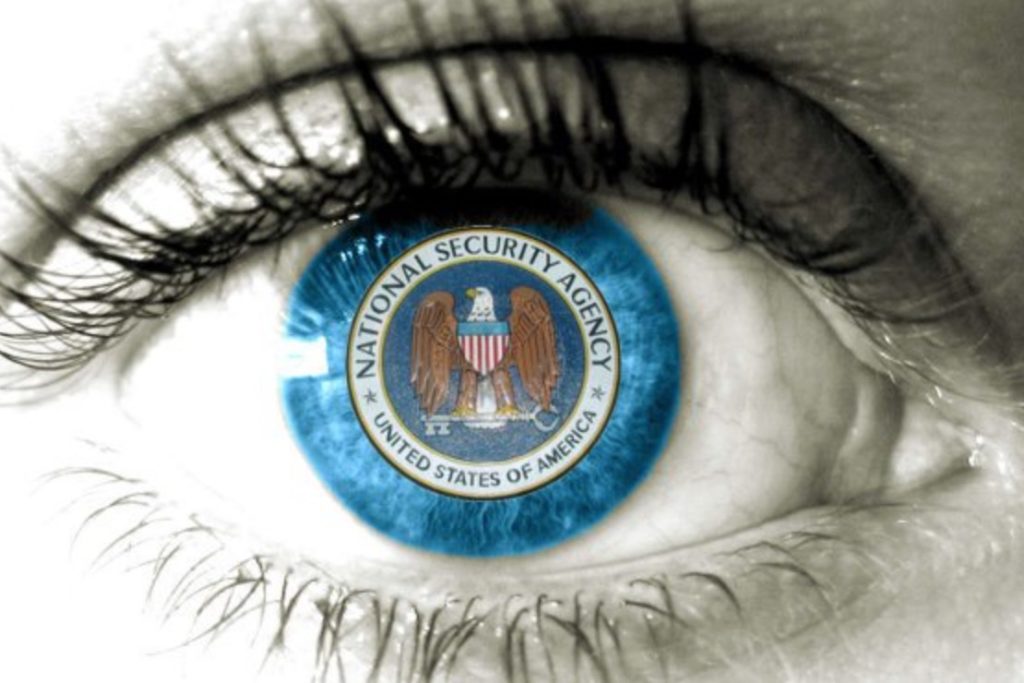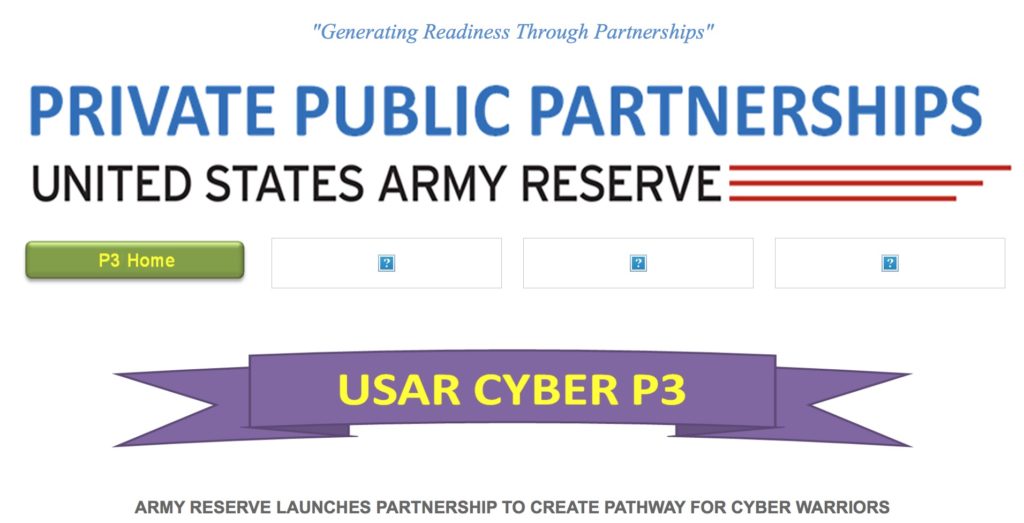
At a time when the Pentagon arguably is losing a battle with industry for top tech talent, the Army is offering companies the resumes of its best cyberwarriors.
The initiative is designed to pump out 3,500 to 5,000 Army reserve soldiers. So far, 21 private employers have signed up to transition service members into civilian careers at Citibank, Microsoft, Fox Entertainment and Chevron, among other companies.
“We’re looking at how do we marry up cyber soldiers with their civilian career,” like a reservist doctor in private practice, Nelson said. “If they do that on a full-time basis and they are immersed in cybersecurity on their civilian job, they are going to be very perceptive cyber soldiers.”
– From the Defense One article: The Army Is Sharing Its Top Cyber Warriors With Hollywood and Wall Street
If there’s one thing I’ve learned over the years, it’s that whenever you hear the term “public-private” partnership, brace yourself for a screw job of epic proportions. It’s in exactly the same vein as the classic observation uttered by the late comedian, George Carlin, about politics:
The word bipartisan means some larger-than-usual deception is being carried out.
It makes perfect sense if you think about it. If you’re a large corporation, there’s nothing better than guaranteed profits; and there’s no better way to guarantee profits than by going into business with the one entity that can do this: government. On the other hand, if you are an ambitious and greedy politician, what better way to earn a fortune while ostensibly engaging in “public service” than by lining the pockets of big corporations, which will then line your pockets in return in various opaque ways. Extraordinary fees for speeches is one preferred way of doing this, as is the classic revolving door that gives the person a cushy corporate job after leaving government.
In many ways, the Clinton Foundation is proving to be the shadiest public-private partnership of them them. Naturally, it isn’t marketed that way, but when the founders of it consist of a former President, and his former Secretary of State and Presidential candidate wife, you can see that this is a money-making scheme masquerading as a charity. I’ve covered this angle in detail over the past few months (links at the end), but right now I want to highlight a much anticipated book that is about to be released by Peter Schweizer titled, “Clinton Cash: The Untold Story of How and Why Foreign Governments and Businesses Helped Make Bill and Hillary Rich.” One thing we found out from the New York Times is that:
From 2001 to 2012, the Clintons’ income was at least $136.5 million, Mr. Schweizer writes, using a figure previously reported in The Post. “During Hillary’s years of public service, the Clintons have conducted or facilitated hundreds of large transactions” with foreign governments and individuals, he writes. “Some of these transactions have put millions in their own pockets.”
Who knew dedicating one’s life to helping less fortunate, “everyday Americans” could pay so well…
That type of cronyism is what happens when you engage in public-private partnerships on a mass scale. You get unbelievable amounts of corruption and incredible wealth concentration. The reason is obvious. When you take the two most powerful segments of society (large corporations and the government) and combine them in one unified force, how can a public that is getting screwed possibly put a stop to it? It’s extraordinarily difficult, which is the primary reason things are so messed up in today’s fraudulent, crony economy.
Another example of a public-private screw job is the current push to “fast track” the Trans Pacific Partnership, or TPP. While it’s marketed as a free trade deal to appeal to the ignorant masses, at its core is a voluntary ceding of government sovereignty to the interests of multi-national corporations via the Investor-State Dispute Settlement system. The Washington Post covered this last month and described ISDSs as:
ISDS, or Investor-State Dispute Settlement, is the international system whereby multinational corporations (MNCs) can sue the governments of countries in which they invest for violating their property rights. International treaties give MNCs access to ISDS, under which ad hoc international tribunals decide whether or not an MNC deserves compensation. There is no appeals system in place.
This isn’t about free trade, it is about protecting multi-national corporations from changes made down the road by governments after the plebs realize how completely sold out they have been. Moreover, you know something is truly evil when there is a complete media blackout on the topic. As I tweeted the other day about the TPP:
There’s been a total media blackout on Trans Pacific Partnership. That’s how you know TPP is a gigantic screw job: pic.twitter.com/iwFpIrQoB9
— Michael Krieger (@LibertyBlitz) April 17, 2015
It’s not just trade of course, the corporate-statist power structure is moving frantically to solidify its dominance in all areas of human life. Edward Snowden confirmed just how monolithic the NSA’s dominance had become by “partnering” with the technology, defense and telecoms industries. Despite current pushback, the NSA and government agencies have no intention of backtracking. In fact, it appears the latest maneuver is to continue this public-private panopticon udder the guise of preventing cyber attacks.
This angle first came across my radar last year, and I covered it in the post, Wall Street Teams Up with U.S. Intelligence Cronies in Bid to Form Fascist “Cyber War Council.” Here’s an excerpt:
Want to hear the worst idea in the history of horrible ideas? How about we take the industry responsible for destroying the U.S. economy and wrecking the lives of tens of millions of people, and then allow it to create a “government-industry cyber war council.”
The man behind the push appears to be ex-NSA chief Keith Alexander, who as I reported on last month, is now: Pimping Advice to Wall Street Banks for $1 Million a Month. As I mentioned in that post, one of Mr. Alexander’s most high profile clients is Wall Street’s largest lobbying group the Securities Industry and Financial Markets Association (SIFMA). Unsurprisingly, SIFMA is behind the latest push to formally merge Wall Street with the government intelligence apparatus. Mr. Alexander isn’t wasting any time.
The latest derivative of this ploy to keep the corporate-statist surveillance grid going into perpetuity has to do with something called Cyber P3, which announced by the Army Reserve earlier this year. Here’s what the Cyber P3 page looks like on their website:
If that doesn’t creep you out, we aren’t cut from the same cloth. Defense One covered this program in more detail in a post yesterday. Here are a few excerpts:
At a time when the Pentagon arguably is losing a battle with industry for top tech talent, the Army is offering companies the resumes of its best cyberwarriors.
This week, in Colorado Springs, eight universities, eight industry employers and various federal agencies will gather to formalize the Army Reserve’s Cyber Private Public Partnership, or Cyber P3.
Among the many questions the initiative aims to address is “how do we retain the investment the Army made in that soldier” and, at the same time, “allow them to get a really good job with our industry partners?”
This should scare the shit out of everyone. With dual loyalties to a powerful corporation and a powerful federal government, who can/will hold these cyber warriors accountable? Nobody.
Two soldiers already have landed jobs at Lockheed Martin and a national security-related firm through Cyber P3, which launched in February.
Cyber P3 aims not only to make sure bodies are on hand in the event of a critical network emergency, but ensure their brains are attuned to the military’s unique needs.
The initiative is designed to pump out 3,500 to 5,000 Army reserve soldiers. So far, 21 private employers have signed up to transition service members into civilian careers at Citibank, Microsoft, Fox Entertainment and Chevron, among other companies.
Nelson called Cyber P3 a “starting point” that could become a model for other agencies to address competing interests among companies, government and the cyber whizzes.
Each military service is moving to establish a cyber reserve component, with the Air Force being the furthest along. For example, by 2013, the Maryland Air National Guard had a volunteer network warfare squad to respond to military network intrusions. At the time, the Estonian ambassador likened the Air Force’s program to her country’s longstanding civilian cyber reserve.
Referred to as a “white-hatted hacker organization” by Estonian President Toomas Hendrik Ilves in 2011, the Estonia version comprises IT professionals from banks, insurance companies and other private businesses who want to do something “defense-related” during the evenings or on weekends.
The U.S. Army’s Cyber P3 seems to be taking a page out of the same playbook to address similar attacks. Russia allegedly shut down Estonia’s Internet access for weeks in 2007, prompting the formation of the Baltic state’s plainclothes cyber brigade.
“We’re looking at how do we marry up cyber soldiers with their civilian career,” like a reservist doctor in private practice, Nelson said. “If they do that on a full-time basis and they are immersed in cybersecurity on their civilian job, they are going to be very perceptive cyber soldiers.”
You have been warned.
For related articles, see:
Wall Street Teams Up with U.S. Intelligence Cronies in Bid to Form Fascist “Cyber War Council”
Hillary Clinton Exposed Part 2 – Clinton Foundation Took Millions From Countries That Also Fund ISIS
In Liberty,
Michael Krieger
Donate bitcoins: 35DBUbbAQHTqbDaAc5mAaN6BqwA2AxuE7G
Follow me on Twitter.




Lighten up, Mike. They’re just keeping us safe.
Luckily for the folks doing all of this the average American is watching American Idol and lots of sports. As long as the bread and circuses continue I doubt there will be a peep out of Joe Six-Pak.
The oligarchs learned well from the Roman Empire. At least the part about controlling the populace. They ignored the part about collapse. They think they are smarter than the ancients.
John P Wheeler III was right.
Do they still have to take the oath “to protect the Constitution from all enemies foreign and domestic”?
Michael…perhaps its wishful thinking on my part. I do believe many MILITARY people,also See,Understand nor Accept the issues and actions,you continuously explore in many of your articles..? Perhaps its a form of ‘Trojan Horse’ action on Their part,thanks for reading,aloha